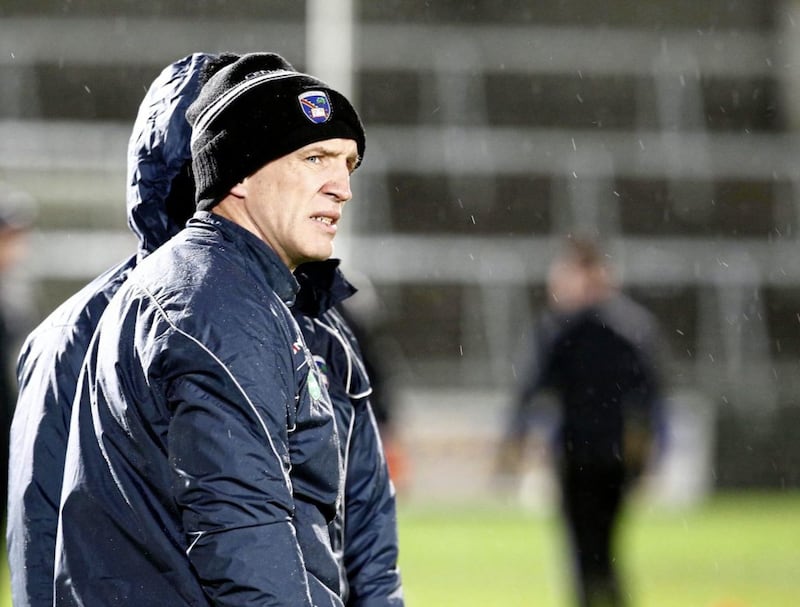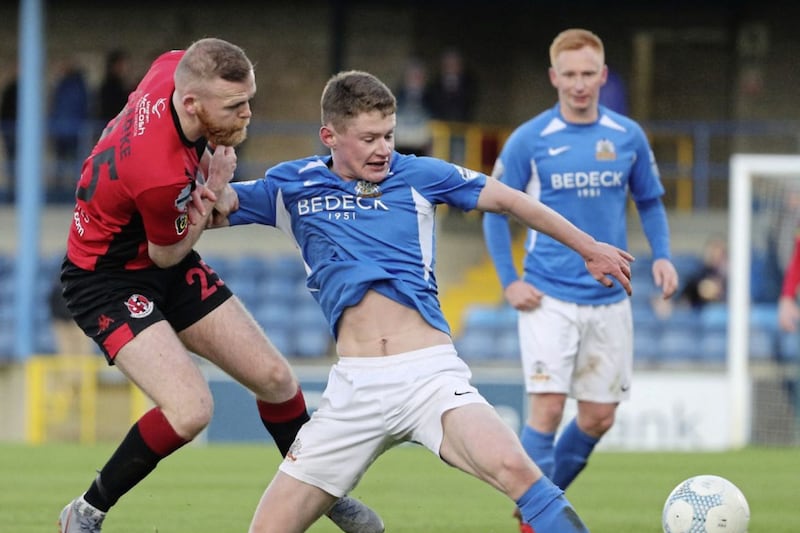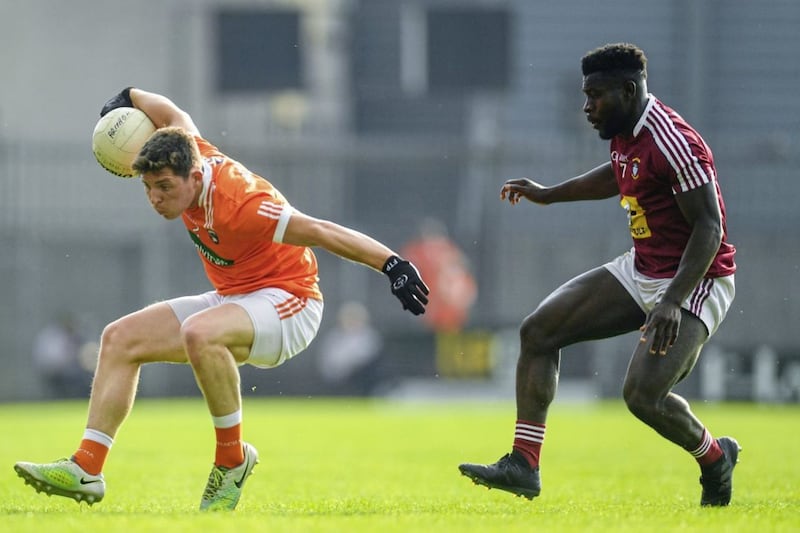Saturday, March 10 2018:
NFL Division Three (The Athletic Grounds): Armagh 1-15 Derry 0-14
The post-match interview:
Journalist: ‘Patrick, you’ve had all these injuries. It must be great to be back playing and playing so well. Did you ever think of quitting?'
Patrick Burns:‘Absolutely not. I never considered quitting Armagh. Never.’
PATRICK Burns winces at his own answer now. Quitting? Me? Not a chance. Never crossed my mind.
Only it did. Lots of times. The words just tumbled out of his mouth and into a journalist’s tape-recorder.
The Forkhill man hasn’t done many interviews, so he says: “Stop me if I’m rambling… but I really regret saying that to the journalist because it was so untrue.”
Burns has had more hamstring tears than he cares to remember. After a while they all merge into one frustrating, depressing, angry blur.
He recalls marking ‘Soupy’ Campbell in training one night in training; it was the last session before a game against Galway that weekend.
He received the ball in the corner-back position and burst up the field.
“There were acres of space in front of me and I went off on a run up the pitch, played the ball and just tore the hamstring. Grade Two, bad tear, one of those ones where the leg goes black and blue…”
He didn’t kick a ball in his first year with the Armagh seniors (2016) and was injured going into his second season. After a while he felt like a spare part. Worse than a spare part; a financial drain on the county with all the physio treatment he was receiving and nowhere near kicking a ball.
“I remember that winter after completing my first year and going into pre-season for the second year, I tried to quit. I rang Kieran [McGeeney] and told him that was it. I couldn’t do the travelling up and down from Dublin and just being injured all the time.
“The next day Kevin Dyas rang me and said: ‘What’s this I’m hearing you’ve left the squad? Don’t be stupid. Just tell Kieran you’ll do your rehab in Dublin with me.’
“I probably cost the county a fortune on physio. I felt like I was a financial burden. Kieran could easily have said: ‘Yeah, good luck to you.’ But he made me stick around. Kevin and I trained that second year in Dublin.”
*********
SPOOL forward to Saturday March 7 2020. A rainy night in Enniskillen. Patrick Burns is bouncing fit and flying up and down the heavy sod like it was a July day.
Nobody is going to beat him on this night, 50-50s, 60-40s – he's winning them all. Burns is razor-sharp.
After a couple of minutes, he springs forward and drops the perfect kick pass into the arms of Jamie Clarke. Goal. Armagh go on to absolutely shred Fermanagh, a team up to that point they always seemed to struggle with.
There have been a couple of false dawns with McGeeney’s Armagh team. One week they’d play bewildering football, and the next… But 2020 was destined to be different.
Apart from one poor showing in Laois, the Orchard men were on the cusp of Division One football with two fixtures remaining – against Roscommon (h) and Clare (a).
With a click of the fingers the season stops.
The coronavirus, this invisible deadly force which has caused the kind of human lockdown never experienced before has wiped out everything in its wake.
It’s a sunny Saturday afternoon in late March. Too good of a day to be stuck indoors. But this is everyone’s new reality.
Burns is self-isolating in his fiancée’s family home in Burren. He’s commandeered the front room of the house.
This interview was meant to take place roughly a year ago. But another hamstring injury derailed it. Now it’s taking place remotely rather than in a coffee shop.
This global pandemic has turned out to be good thinking time for everyone.
What have we learned? What will we do when it’s over? Will we be any different?
Before ‘coronavirus’ or ‘Covid-19’ – take your pick - seeped into our every-day vernacular, this was how Burns rolled between Monday to Friday.
Up at 6am. Out the door for 6.30am. Drive to Dundalk. Hop on a bus at 7. Head to Dublin.
Off the bus at the docks area in the capital at 8.15. Jump on a bike. Cycle across town to St Stephen’s Green (where he works in Actuary). In the office for 8.30am. Do a day’s work.
Leave the office at 5pm. Back on the bike. Zip through the traffic. Catch the 5.30 bus to Dundalk.
Back in the car. Drive home to Forkhill for 6.45. Another drive to Armagh for training at 7.30pm. That’s providing everything runs smoothly and there are no tractors on the road.
Foam roll. Stretch. Bandage the ankle he had surgery on last November. A team meeting. Out on the pitch for 8pm.
Train. Showered. Fed. Hydrated. In the car. Homeward bound.
“I mightn’t be back in Forkhill that night until 11.15 or 11.30pm,” he says.
“When you look at it, from 6am to 11.30pm, that’s a full day where my fiancée [Orla McKay from Burren] has been barely been able to get in contact with me. So, this lockdown period is a good chance to have some quality time together.
“Playing inter-county football is a selfish existence - there’s no point in denying it - it’s a selfish endeavour. But the life that I’m living has a shelf-life too.
“I don’t anticipate doing this for a long time – you see fellas playing until they’re 33 or 34 – I don’t think I could keep it up for that long.”
On life under lockdown, he reflects: “I wouldn’t necessarily say that this is nature getting back at us and telling us that we need to change our ways, although I would like to take it that way but I don’t necessarily think that’s the cause. I do think that it’s an opportunity to take stock of how we were all living and whether that’s sustainable.
“And I’m not even talking about the environment, just generally: family life, community life, those kind of things.
“I’m sitting saying this to you now but I can almost guarantee in five or six months when, please God, things are getting back to normal… I’ve been doing that commute to Dublin and it’ll be back to square one, so I don’t want to come across as a hypocrite but we’ll maybe learn during this time, we’ll enjoy spending more time with our families, enjoy this slower pace to life because there’s nothing wrong with that.
“If we could all maybe take a few steps back from where we were going and allow ourselves to re-frame what’s important, I think that could be a long-term benefit from it. There aren’t many benefits from it. [But] If we were losing sight of what was important in our pursuit of material goals, that’s not really going to get us anywhere – it’s certainly not going to bring us happiness anyway.”
*********
BURNS is one of the team’s social organisers. He’s ran a couple quizzes remotely with his team-mates and management. There are geography, sport, picture and National League 2020 rounds: like, who has had the most scores in the team, the most fouls (Mark Shields, allegedly).
“I love organising things to keep the lads going. I was trying to figure out recently what we could do now that we’re all apart and will be for a while; how could we keep everybody in contact?
“So, I decided to split the squad up – into six or seven teams and a management team - and I did a pub quiz last night.
“I put the questions into the main WhatsApp group; they’d take them away to their own individual groups and send me back the answers. I’m trusting them to not Google the answers...
“We did a round where I'd send a voice note into the group and read the lines of a song and they would try to work out what the song was. There were bonus points going too if they sent me back a voice note of them singing the actual song (laughing). So it meant I’d a load of voice notes of the boys singing songs. It was great craic.”
*********
THE rules were simple. The ball would be thrown into the air and elder brother Conor and Patrick and their father Fintan would fight over who could fetch it.
Fintan, a hugely influential member of Peadar Ó Doirnín Forkhill GAA club, never let Conor or Patrick win the game.
If they got their hands on a ball before their father, they earned it.
Along with his father, Sherman Hall and Paddy McQuade were hugely important figures in Burns’s young career.
“Sherman made you feel like there was nothing you couldn’t do. He was that kind of a man. And then there was Paddy who coached us through underage. Paddy was the tactician, making sure your skills were right. He just instilled that competitiveness in us and getting the best out of yourself.”
They pieced together a very decent U14 team in the club that included Jemar Hall, son of Sherman and Burns’s county team-mate, and Paul Grant.
Later, Forkhill amalgamated with Culloville where Martin Watters guided them to an intermediate minor title.
“We never wanted to lose. We were a really competitive group of kids. It was an environment that didn’t do us any harm either,” Burns remarks.
He progressed to the county minors and U21s but another hamstring tear deprived him of his last year at U21 level before treading into senior terrain.
His football apprenticeship was greatly aided by playing for Queen’s Freshers and winning an All-Ireland title under Bernie Murray. Burns used to love Down and Queen’s great Sean O’Neill coming into the changing room and giving the players a pep talk before games.
A year’s placement saw him move to Dublin, however, and that’s where his football career reached a crossroads.
“It was that year I needed to figure out what I was going to do with my football. I lived near enough to Kilmacud Crokes pitch, so I just drove up one day and they’d a match.
“I walked over to the manager and said: ‘I’m living in the area. Is there any chance you’d let me train with you?’
“It was actually Conor Deegan who was their manager at the time and he said: ‘Are you any good?’
“I was waiting on him saying: ‘You can train with the seconds or thirds.’
"And I said: ‘I don’t know. I was with Armagh minors.’
“He said: ‘Yes, you can train with us. Give me your number and I’ll add you to the WhatsApp group.’
“I trained with them for a year and a bit and I was injury-free, and I can tell you I got a lot out of training with that team.
“They operated like a county team, the way they trained. It was two pitch sessions, two gym sessions during the week and they’d have a match at the weekend and I’d have a match at home. Conor Deegan was a great man for me.
Burns was mesmerised by some of the athletes at Kilmacud, none more so than Craig Dias (Dublin) and Shane Horan (Offaly).
“There was a huge part of me thought I would play for them because I’d planned to live in Dublin, and I trained with them the following season as well. The second year Gabriel Brannigan of Monaghan took the team and Ray Cosgrove coached us.”
Despite a good offer to spend the summer in America, Burns decided to stick with Forkhill who had smashed the glass ceiling and were playing in Armagh’s top flight.
With Forkhill taking a few scalps in the big league and the Kilmacud experience improving him no end, Burns was finally on Kieran McGeeney’s radar.
Football in the dead of winter is not for the faint-hearted – but it’s a time when the hungriest trialist flourishes.
Burns took his chance with both hands as the trialists defeated the Armagh squad of 2015.
The Forkhill man was in.

Since that horrible night in Tullysarran, it’s been a rollercoaster for one of Forkhill’s finest.
From one hundred nights on the physio’s table to the sweltering heat of O’Moore Park when Roscommon and Armagh played out a modern-day classic and a balmy night in Castlebar when they should have beaten Mayo, the buzz of the big days are absolutely exhilarating, indescribable things.
Bit by bit Armagh are getting there.
Asked to sum up his Armagh career to date, he replies: “Grand. Around average. I think the position I’m playing [corner-back] doesn’t really lend itself to hyperbole. You get forward five, six times a game. Ninety per cent of my job is trying to make sure their best player doesn’t operate.”
Laughing, he adds: “One of the lads in work is from Longford and he calls me an ‘anti-footballer’ because it’s my job to stop a footballer.”
Anyone who has watched Burns in full flight would beg to differ.
With time on his hands and taking the good out of each day, the the 27-year-old Forkhill native looks forward to when he’s back on a pitch with his team-mates, whenever that will be, and he will give thanks.
“I don’t have any superstitions,” he says. “I’d be a practising Catholic. That’s important to me. I don’t push it on anyone, I’m not that type of person. The lads on the team will tell you that; I’m up for the craic as much as anybody.
“If we’ve an away game I’d sit on the bus and I’d get a rosary in. And people would say: ‘Why are you praying if an opponent on the other bus is praying too? Who does he (God) pick?’”
“But that’s not what I’m really doing. I just get a bit of comfort out of it. It’s not really a superstition but I’d say a few prayers before a game.”
From Forkhill to Dublin and back again a million times, Patrick Burns is fulfilling his rich potential on the inter-county stage.
He's enjoying the slower pace of life just now and nature's gaze.
As for quitting the game he loves? Not a chance. Not now. Never. The day is still young...







